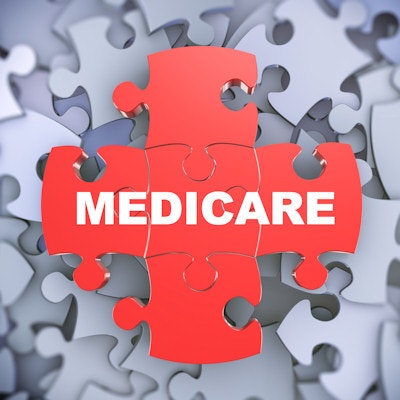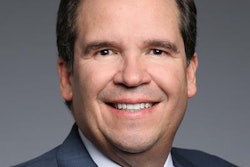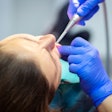
For the first time since Medicare's inception in 1965, there is a real chance that Congress may pass legislation that would make dental, vision, and hearing benefits a part of Medicare Part B. millions of aging people in the U.S. could actually look forward to the cost of these services no longer being a significant barrier to their health.
The ADA, however, is calling for means testing for a dental benefit in Medicare, limiting the benefit to those individuals making less than 300% of the national poverty level. That means a large proportion of Medicare recipients will not be eligible for dental coverage. This is wrong and a betrayal of public trust.
 Dr. Frank Catalanotto.
Dr. Frank Catalanotto.What would the ADA proposal of means testing mean to the average senior? Well, an income of 300% of the poverty level is about $38,000 for a single person and about $52,000 for a couple. Take out taxes, rent, utilities, transportation, and clothing, and there's not much left.
An annual routine dental examination with x-rays and cleaning can run anywhere from $150 to more than $200 per person, and then you'll be advised to do at least the exam and cleaning twice a year. Not to mention the cost of treatment. One crown exceeds $1,000; root canals exceed $1,000; an upper or lower denture can be more than $1,600 or $3,200 for the pair. Even routine fillings can cost more than $150.
About 65% of seniors have no dental insurance, and even for the few who do, dental insurance annual limits are usually no more than $1,000 or $1,500 -- and that's for the best plans. The copays and deductibles can be very high.
For millions of seniors whose incomes fall below the 300% threshold, there would still be little benefit, especially if dentist participation is no better than in the current Medicaid program. For those whose incomes are above the threshold, there would be no benefit at all. The ADA plan would leave seniors pretty much where they are right now, with no dental coverage and no accountability from the ADA.
Another strike for oral healthcare
Why would the ADA support such a policy? Well, the ADA has always maintained a position of keeping the government out of their lives (and out of yours -- even when it might help you).
Let's review the history, starting in 1965 when the ADA lobbied successfully to keep dental care out of Medicare. Strike 1!
We can then move ahead to 1993-1994, when Congress was considering health reform under the Clinton administration. A national coalition of organizations worked hard to inform Congress of the importance of -- and rationale for -- the inclusion of dental care in reform proposals. And while the major reform bills that were considered by Congress all included a comprehensive dental benefit package, the ADA was not among the groups to support these plans. The ADA did not just remain on the sidelines. It actively worked against the inclusion of dental benefits. Strike 2!
More recently, the ADA worked to exclude comprehensive dental care from the Patient Protection and Affordable Care Act. Strike 3!
So here we are at the next opportunity. Once again, we are on the brink of bringing dental, vision, and hearing care to America's seniors. A large coalition of national organizations has been working hard for the past several years to inform members of Congress of the importance of oral health and how oral health is an integral component of one's overall health.
The ADA was at the coalition table. But then we began to hear rumblings that the ADA was going to advocate for adding senior dental benefits to the Medicaid program or for means testing the dental benefit in Medicare, e.g., only seniors whose incomes fall below 300% of the poverty level would be eligible.
In recent weeks, the ADA publicly abandoned the work of the coalition and sent a letter to all its dentist members throughout the country encouraging them to contact their congressional representatives to include the 300%-of-poverty-level cutoff in their legislation. Strike 4!
The ADA doesn't speak for all
People older than 65 often need more expensive treatment, and some might think the ADA is fearful that government involvement will lead to regulating how much a dentist can be reimbursed for care provided to Medicare enrollees -- only a small percentage of most practices -- and that it might affect a dentist's income.
It is interesting that here we have the ADA stepping out to "safeguard" public funds at the expense of the public. Why would the ADA label dental care as an essential health benefit when it suits its needs, but apparently not consider it an essential health component of Medicare?
No other service included in Medicare Part B is or has ever been provided based on means testing. Means testing may serve the interests of the ADA, but it does not serve the interests of the public.
It is time that our leaders and policymakers begin to understand that while the ADA has been responsible for great advances in oral health, especially for those who can afford dental care, either by out-of-pocket costs or insurance, it has not adequately represented the needs of those for whom oral health has been out of reach.
Dr. Frank Catalanotto is currently a professor in the department of community dentistry and behavioral sciences at the University of Florida. He is also a founding member and part of the leadership teams of the National Coalition of Dentists for Health Equity and Floridians for Dental Access. The views he expresses are his own and do not reflect the views of any organization he is associated with.
The comments and observations expressed herein do not necessarily reflect the opinions of DrBicuspid.com, nor should they be construed as an endorsement or admonishment of any particular idea, vendor, or organization.



















